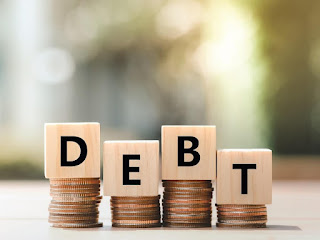After we hear the phrase “debt,” it is easy to think about it as one thing unfavourable—like a burden that weighs us down. However debt isn’t at all times the villain of the monetary story. In truth, debt decision packages, for instance, may be helpful instruments. This brings us to the thought of “good debt” and “unhealthy debt.” Sure, there’s a distinction! Understanding this distinction can assist you make smarter monetary decisions and even leverage debt to your benefit. So, let’s dive into what separates good debt from unhealthy debt and the way to determine which is which in your personal monetary life.
Good Debt: An Funding in Your Future
Good debt is like an funding in your future. It is the form of debt that has the potential to extend your wealth or enhance your life in the long run. Consider it as cash you borrow to amass one thing that can admire in worth or generate earnings. A traditional instance is a mortgage. Once you take out a mortgage to purchase a house, you are investing in an asset that can probably enhance in worth over time. Plus, homeownership may give you fairness and a steady place to dwell.
One other instance of fine debt is pupil loans. Whereas the thought of taking over debt to pay for training might sound daunting, it’s vital to think about the long-term advantages. Schooling can open up higher-paying job alternatives and give you abilities that may enhance your incomes potential. On this manner, pupil loans may be seen as an funding in your future earnings.
Dangerous Debt: The Value of Depreciating Property
Dangerous debt, alternatively, is the sort that prices you cash with out including any worth to your life. It is often tied to purchases that depreciate rapidly and don’t supply any long-term advantages. Bank card debt is a first-rate instance. Once you use a bank card to purchase issues like garments, devices, or eating experiences and do not repay the steadiness instantly, you find yourself paying excessive curiosity on these purchases. Not solely are these things more likely to lose worth over time, however the curiosity you pay can rapidly add up, making the unique price a lot increased than you initially spent.
Auto loans may fall into the class of unhealthy debt in case you’re not cautious. Whereas automobiles are needed for many individuals, they depreciate rapidly. In case you take out a mortgage for a automotive that’s past your means or that you may’t repay rapidly, you may find yourself owing greater than the automotive is price. That is very true in case you go for a high-interest mortgage or an extended mortgage time period.
It is About Context: Your Distinctive Monetary State of affairs
This is the place it will get attention-grabbing: figuring out whether or not debt is sweet or unhealthy isn’t at all times black and white. It actually is dependent upon your distinctive monetary state of affairs and targets. What could be thought of good debt for one particular person could possibly be unhealthy debt for one more. As an example, taking out a mortgage to begin a enterprise could possibly be seen pretty much as good debt when you’ve got a strong plan and the potential to earn a big return in your funding. But when the enterprise is dangerous and also you’re not ready for the opportunity of failure, it may flip into unhealthy debt.
Equally, utilizing bank cards isn’t inherently unhealthy. In case you use them responsibly, repay the steadiness in full every month, and benefit from rewards or cashback presents, they will truly be a useful monetary device. The bottom line is to keep away from carrying a steadiness that accrues excessive curiosity.
If you end up tangled in debt and are not positive the way to categorize it or what to do subsequent, wanting into debt decision packages could be a superb step. These packages can assist you perceive your debt and create a plan to handle or get rid of it, making it simpler to differentiate between what’s useful and what’s holding you again.
How A lot Can You Afford to Lose?
One other issue to think about when evaluating debt is danger tolerance—primarily, how a lot you’ll be able to afford to lose. With any form of debt, there’s a sure stage of danger concerned. Even what we take into account “good debt” carries the chance that issues may not go as deliberate. As an example, the worth of your private home may lower as a substitute of enhance, or your training may not result in the higher-paying job you anticipated.
Earlier than taking over any debt, it’s essential to think about your total monetary stability and the way a lot you’ll be able to afford to lose if issues do not go as anticipated. This entails taking a look at your financial savings, emergency fund, earnings stability, and different monetary obligations. If taking over a selected debt places you in a precarious place the place you’re one sudden expense away from monetary hassle, it may not be well worth the danger.
Managing Debt Properly
Whether or not you have got good debt, unhealthy debt, or a mixture of each, managing it properly is vital to sustaining your monetary well being. Listed here are a couple of suggestions that can assist you try this:
- Create a Funds: Understanding the place your cash goes every month can assist you make knowledgeable selections about taking over new debt and managing present debt.
- Pay Off Excessive-Curiosity Debt First: When you’ve got a number of money owed, prioritize paying off those with the best rates of interest. This will prevent cash in the long term and show you how to develop into debt-free sooner.
- Make Further Funds: Each time attainable, make additional funds towards your debt. Even a small quantity could make a giant distinction over time.
- Keep away from Impulse Purchases: Earlier than utilizing credit score to make a purchase order, take a second to think about if it’s one thing you actually need and in case you can afford to pay it off rapidly.
- Search Skilled Assist if Wanted: If managing your debt feels overwhelming, take into account looking for recommendation from a monetary advisor or wanting into debt decision packages to get a deal with in your state of affairs.
Conclusion: Making Debt Work for You
Debt doesn’t must be the enemy. By understanding the distinction between good debt and unhealthy debt, you may make extra knowledgeable selections that align along with your monetary targets. Good debt generally is a highly effective device that helps you put money into your future and construct wealth, whereas unhealthy debt can maintain you again if not managed rigorously. The bottom line is to be aware of how you utilize debt, contemplating your distinctive state of affairs and the way a lot danger you’ll be able to comfortably tackle.
Keep in mind, it’s not simply concerning the labels of “good” or “unhealthy.” It is about the way you handle your debt and use it to your benefit. By taking management of your debt and making sensible monetary decisions, you’ll be able to flip debt right into a stepping stone towards a safer and affluent future.
Supply hyperlink










